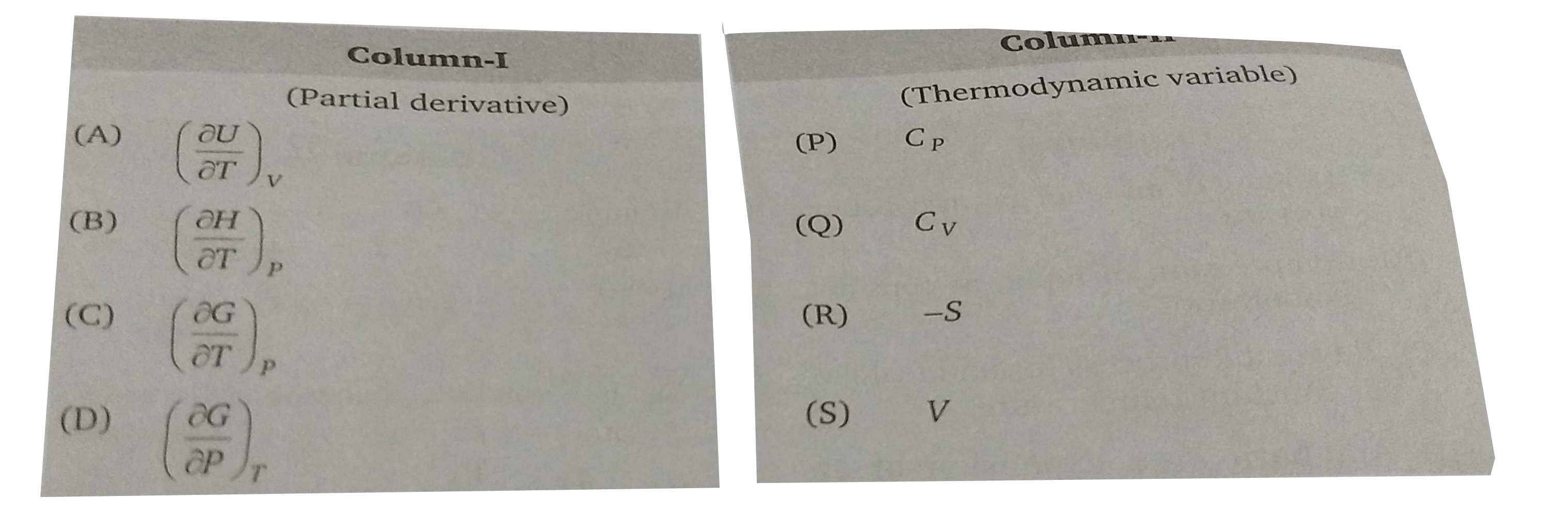10 mole of an ideal gas is heated at constant pressure of one atmosphere from 27∘C to 127∘C. If Cv,m=21.686+10−3T(JK−1.mol−1), then ΔH for the process is :Solution in Punjabi
3000 J
3350 J
3700 J
3181.4J,2350J
The correct Answer is:D
Cp,m=(21.686+8.314+10−3T)
=30+10−3T
∫ΔH=∫nCp,mΔT
=10×∫(30+10−3T).dT
ΔH=10×30(T2−T1)+10−32×[T22−T21]×10
= 30350 J
Topper's Solved these Questions
- BOOK - NARENDRA AWASTHICHAPTER - THERMODYNAMICSEXERCISE - Level 3 - One Or More Answers Are Correct1videos
THERMODYNAMICS
- BOOK - NARENDRA AWASTHICHAPTER - THERMODYNAMICSEXERCISE - Level 3 - Match The Column2videos
THERMODYNAMICS
- BOOK - NARENDRA AWASTHICHAPTER - THERMODYNAMICSEXERCISE - Level 2 (Q.1 To Q.30)1videos
THERMODYNAMICS
- BOOK - NARENDRA AWASTHICHAPTER - STOICHIOMETRYEXERCISE - Level 3 - Subjective Problems20videos
STOICHIOMETRY
Similar Questions
Assume ideal gas behaviour for all the gases considered and neglect vibrational degrees of freedom. Separate equimolar sample. Separate equimolar samples of Ne, O2 , CO2 and SO2 were subjected to a two process as mentioned. Initially all are at same state of temperature and pressue.
Step I → All undergo reversible adiabatic expansion to attain same final volume, which is double the original volume thereby causing the decreases in their temperature.
Step → After step I all are given appropriate amount of heat isochorically to restore the original temperature.
Mark the correct option(s) :04:16View SolutionMatch the following columns
 07:05View Solution
07:05View SolutionWrite structure of 2,2-dimethylheptane.
02:33View SolutionWhat volume of a liquid (in L) will contain 10 mole ? If molar mass of liquid is 280 and its density is 1.4 g/mL.
04:22View SolutionOne moles of an ideal gas which C_(V) = 3//2 R is heated at a constant pressure of 1 atm from 25^(@)C to 100^(@)C . Calculate DeltaU, DeltaH and the entropy change during the process.
05:44View SolutionOne mole of a monoatomic ideal gas is heated at constant pressure from 25^(@)C to 300^(@)C . Calculate the DeltaH,DeltaU , work done and entropy change during the process. Given C_(v)=3/2R .
01:32View Solution3.0 moles of ideal gas is heated at constant pressure from 27^(@)C to 127^(@)C . Then the work expansion of gas is
02:01View SolutionTwo mole of an ideal gas is heated at constant pressure of one atmosphere from 27∘C to 127∘C. If Cv,m=20+10−2T JK−1.mol−1, then q and ΔU for the process are respectively:
View Solution10 mole of an ideal gas is heated at constant pressure of one atmosphere from 27∘C to 127∘C. If Cv,m=21.686+10−3T(JK−1.mol−1), then ΔH for the process is :
03:10View SolutionHow much energy is absorbed by 10 moles of an ideal gas if it expands from an initial pressure of 8 atmosphere to 4 atmosphere at a constant temperature of 27∘C?
(R=8.31J mol−1 K−1)05:14View SolutionOne mole of an ideal gas is heated from 0^@ C to 100^@ C at a constant pressure of 1 atmosphere. Calculate the work done in the process.
03:10View SolutionOne mole of an ideal gas (C_(v) = 3/2R) is heated at constant pressure of 1 atmosphere from 25^(@) C to 100^(@) C. Calculate DeltaE and DeltaH .
04:44View SolutionTwo mole of an ideal gas is heated at constant pressure of one atmosphere from 27∘C to 127∘C. If Cv,m=20+10−2TJK−1mol−1, then q and ΔU for the process are respectively.
03:44View Solution10 mole of an ideal gas is heated at constant pressure of one atmosphere from 27∘C to 127∘C. If Cv,m=21.686+10−3T, then ΔH for the process is x×105J1. Then x is
View SolutionTwo mole of an ideal gas is heated at constant pressure of one atmosphere from 27∘C to 127∘C. If Cv,m=20+10−2TJK−1mol−1, then q and ΔU for the process are respectively.
04:18View SolutionTwo mole of an ideal gas is heated at constant pressure of one atmosphere from 27^(@)C to 127^(@)C . If C_(v,m)=20+10^(-2)"T JK"^(-1).mol^(-1) , then q and DeltaU for the process are respectively:
02:05View Solution

